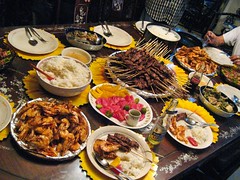Harvesting and distillation
by gautsch
In a little conversation this morning on the art and practice of harvesting we got into a conversation about the pattern of distilling. We talked about what it takes to lay a table with a meal for a group of six friends. How no one can creat a meal from scratch, and that everything from the food to the table, to the machines that transported the food, to the people that sold the chairs and built the factory that created the plates all contributed to that meal. That a single meal with friends is a distillation of thousands of person years of work.
The whole field of the harvest is a field of potential. When we distill from that we make choices about what the highest and best use of that field might be, for that very moment, in the domain in which we have influence. This isn’t always easy, and sometimes people are attached to pieces of the harvest that are left behind in the distillation, feeling unappreciated or unseen. Eating mindfully means being aware of and honouring everything that goes in to the food, and being grateful that we can be present at the nourishing end of the process.



Interesting post, Chris. You know, when you talk about distilling, my mind doesn”™t really go to eating and food, but rather to the production of single malt scotch whiskey (preferably the 18 or 25 year old variety!).
It has always awed me that by taking simple ingredients ”“ water, malted barley and the effective application of heat — that an amazing complexity emerges. A whiskey produced on the Speyside is a completely different scent, taste and experience than one produced on Islay, due to a myriad of geographical and time variables (and just a little bit of magic!). It is a fascinating process of alchemy, transformation and potential.
And it is a very mindful production. Every action is done with purpose, and, in the good distilleries, with patience and love. I also like the fact that during the process nothing gets thrown out. Once, at Edradour distillery near Pitlochry we watched a warehouseman shovel the used barley into the horse and cart of a local farmer so he could use it to feed his cattle (lucky cattle!). In the distillation process the master distiller will siphon off the middle third for the final product, while the first and last third go back into the distillation process and eventually get used. Nothing is wasted.
Simple conversational ingredients in the form of unique and honest individuals come together and with a little application of heat (the critical questions) may cook up a powerful nectar which can literally alter an individual”™s perception and reality. Yes, there will be those, like the barley for the cows, that choose to exit the conversation without a sip, but I”™d like think they still exit with something for having been part of the process.
This really struck me today. Especially the part about the meal being the culmination of so much that came before it. I facilitate many ecological design and permaculture trainings and shared meals are always a part of that; I’d like to bring this concept of distillation to the fore of the trainings AND the meals. Thank you.
Alistair. The moment you wrote “Islay” my mouth began to water. Had a Laphroaig a couple of days ago. Love that one.
@Lisa…you are welcome!